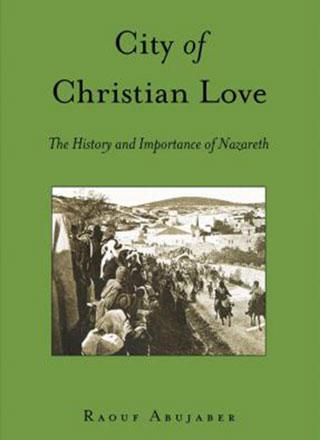You are here
Book chronicling Nazareth’s interfaith relations launched
By Saeb Rawashdeh - Aug 26,2017 - Last updated at Aug 26,2017
AMMAN — A book on interfaith relations by noted historian Raouf Abu Jaber “Nazareth — City of Christian Love” was launched at the National Library in Amman on Thursday.
For Joseph Prudhomme from Washington College, the new book of Raouf Abu Jaber is “a signal contribution to the literature on the holy land”, and it deserves to be “widely read and deeply studied”.
“First, Abu Jaber asks that we test the fashionable theory of a necessary clash of civilisations between the Christian and Islamic traditions,” he noted at the launch ceremony
“The history of this specific place — Nazareth — which Abu Jaber discloses to us, shows that there have indeed been periods of tension between these two civilisations [to use American political scientist Samuel Huntington’s term]: the historical record manifests this, and the historian’s task is not to buy history but to reveal it,” Prudhomme stressed.
“When the historian’s task is done really well — as it so conspicuously done in this volume — the past of this particular place shows periods of solidarity, concord and amity,” the American scholar added.
In fact, one aspect of this history bears repeating: the differences within civilisations are often as great as the differences between civilisations, he said.
The people of Nazareth — including very much the Muslim population — often worked together to secure regional autonomy, even when that meant repelling the advances of one’s co-religionists, in this case the Muslim population’s concern with the foreign and often arbitrary rule of the sultans in Istanbul, Prudhomme noted.
This book is the “new vision” on relations between Muslim and Christian communities not only in this region but in the world in general, said Professor of Political Science at the Hashemite University Jamal Shalabi.
“Abu Jaber gave us a good idea on how to live together in coexistence and harmony,” Shalabi said.
For Mahmoud Yazbek from University of Haifa, the book has a “very significant message”, as younger generations lost touch with the ‘‘glorious past of their ancestors”.
Himself from Nazareth, he maintains that “we are rooted in that area whether as Muslims or Christians”, and one can “feel the love” while walking in the old streets of Nazareth.
The work of the Jordanian historian is very relevant, Yazbek continued, especially now that the region is engulfed in sectarian violence and wars.
“Two things first come to my mind about the positive features of the history of this city that should be retained to this day, and should continue to exist: what I call ‘the power of local attachments’ and the ‘promise of neighbourliness’,” Prudhomme said.
“Inspiring histories like this book can help us all to come closer to living the command found in the Book of Leviticus, in the Gospels of Mark, Matthew and Luke, in the writings of Paul and James, and in the spirit of the noble Koran: the command to love our neighbour, and to see in each human being that neighbour, whom the religious wisdom teaches us that we must love as we love ourselves,” the American expert on interfaith relations noted.
Related Articles
AMMAN — Noted historian Raouf Abu Jaber will launch his new book "Nazareth — City of Christian Love" at the National Library in Amman on Thu
City of Christian Love: The History and Importance of NazarethRaouf AbujaberNew York: Peter Lang, 2017Pp.
AMMAN — The University of Jordan (UJ) has received a JD1 million financial grant from Jordanian historian Raouf Abu Jaber to build a centre


















